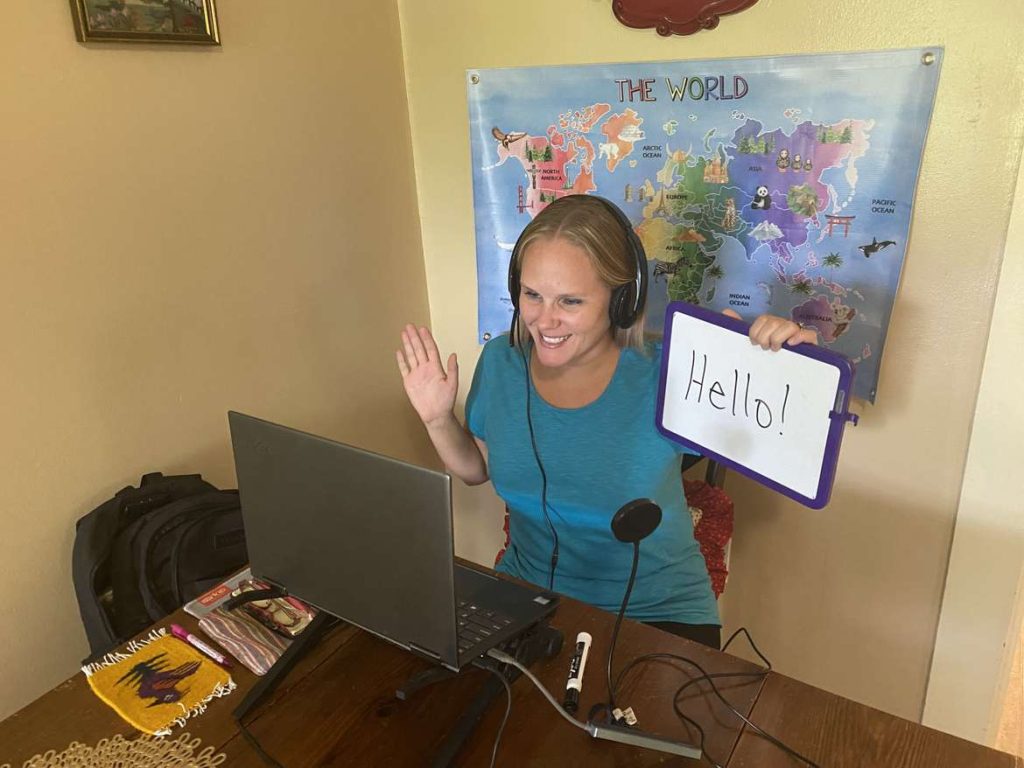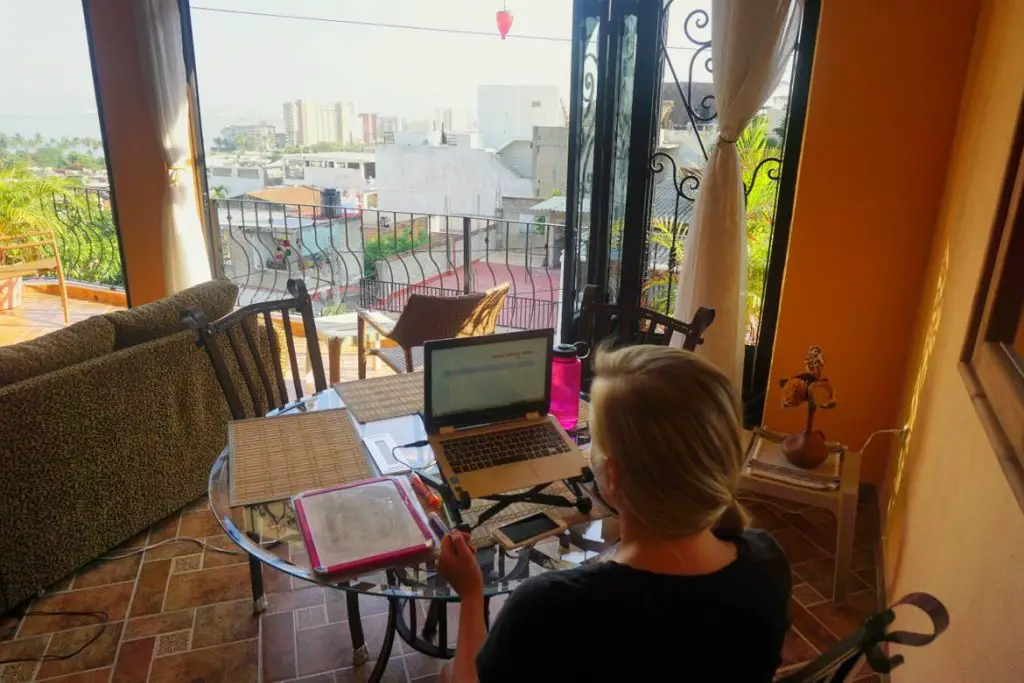Welcome back to our ESL Around the World interview series! Today we’re going to learn about what it’s like teaching English in Japan!
This series is for people thinking about teaching English abroad. It’s meant to give you all the information you could possibly need about teaching English in a certain place. It’s brought to you from people who are speaking from experience. We’ve already got interviews about teaching English in Mexico, Cambodia, Oman, Afghanistan, and Kazakhstan.
Meet James

James Ian has been traveling for almost 30 years, and teaching English in Japan was one way to continue his travels and get to know Japanese culture really well. He now helps people have awesome travel experiences through his blog Travel Collecting.
One of his favorite memories when traveling is visiting Saihoji Moss Temple (Kokedera) in Kyoto.
Now that you’ve gotten to know James a little bit, let’s get on with the interview!
Teaching English in Kobe, Japan
Where did you teach and what was your position?
I taught in Japan as an ESL instructor in a chain of private language schools. I was in Kobe.
What were the hours and pay like?
I worked mostly 1:20pm – 9:00pm. Days off were during the weeks. I had an occasional 10:00am-5:40pm shift.
The shifts were designed to have most of us working after school/ work and on the weekends when people were available to study English. During the day we taught mostly housewives and after-hours, high school students, and workers.
The pay at the time was about $3,000 USD per month, which was enough to make a reasonable living and save some money. I made extra money by doing overtime when teachers at nearby schools in the same chain called in sick on my days off. Transportation to and from work was paid for by the company, which is common in Japan.
What was a typical day like?
We taught eight 40-minute lessons a day with 10 minutes between each lesson to plan and write up notes.
I taught mostly general English, but also taught some business English (I have a business degree) and some TOEFL and TOEIC Preparation classes. I didn’t teach young learners, but a lot of other teachers did.
What were the pros and cons of your job?
PROS – It was a great way to learn about Japanese culture, as the students were very open to sharing and answering questions. I liked the hours, as my friends were also teachers and worked similar hours. There were English-speaking Japanese staff who were very willing to help me if I had any difficulties with anything at all.
CONS – Sometimes the students were reticent to speak, and this was challenging when I first started. Not having weekends off wasn’t great, and there was very little vacation time (10 days per year).
What do you need to teach in Japan?
I started on a working holiday visa (and taught part-time) and then upgraded to a work visa and got sponsored by my company.
I needed a Bachelor’s degree (in anything) and to be from one of the main native English-speaking countries – this is a Japanese visa requirement. At the time – this was several years ago – I did not need a TEFL/TESOL certificate. They only gave me three days of training and I was a terrible teacher.
Now having a TEFL certificate is a requirement.
I think everyone SHOULD have a TESOL/TEFL certificate as a minimum to teach. (I later got a CELTA and an MA TESOL, and am now Executive Director of an English language Institute.)

What’s the best way to find a teaching job in Japan?
I arrived on a working holiday visa with no job. I arrived on a Wednesday, called up the same day, had an interview on Thursday, found out I got the job on Friday, and started Monday.
This is not common, though, I think. I would recommend looking at some websites that post ESL jobs like Daves ESL Cafe and lining up a job first.
Why did you choose to live and teach in Japan? What did you like and dislike about it?
To be honest, I chose it because a friend was going there and I could get a working holiday visa. I loved it though.
I stayed for 2 years, left for a year and a half, and then went back for another year and a half. It’s an interesting place to live and travel in, with a culture that is very different and lots of things to see and do. Japanese people are very kind and happy to help.
Many teachers suffered culture shock and some didn’t last through the stages to get to the other side and went back home. But I loved that it was so different.
What is the cost of living like compared to your earnings? Are you able to save money?
Transportation to and from work is paid with an unlimited card that you can use outside of the commute, so that saved a lot of money.
The cost of living was actually not as high as you expect from Japan. I worked overtime but had enough money to go out on the weekends, travel to another city or part of the country at least one weekend a month, and then I backpacked around the Americas for a year on my extra savings.
Have you taught in another city or country before?
I have taught in Sydney, Australia, and in New York City, USA. My other positions include Assistant Director of Studies, teacher trainer, Center Director, and Executive Director of language schools, both private and university-based.
I started in Japan and have made a career out of teaching ESL. The main differences between teaching in Japan and in native English-speaking countries are that students in Australia and the USA are from all over the world, so classes can use this as an interesting teaching point, but students all have different first language interference.
The hours are also different – regular office hours are more common. The pay is terrible (whereas in Japan, it was an above-average wage), with no benefits, especially in the US.
What advice do you have for people considering moving abroad to teach English?
Get a TESOL, TEFL, or CELTA certificate. Just because you are a native speaker of a language doesn’t mean you know anything about teaching.
It’s a fun job that lets you interact a lot with people!
Conclusion
After reading about James’s experience, it seems like teaching English in Japan would be a great option! I always thought that the high cost of living in Japan wouldn’t allow you to save any money but James was able to take his savings and travel around the Americas.
Teaching English is a great way to fund your travels. We were able to take a 14-month long gap year with the money we saved by teaching English in China. You can do the same; you just need to make the jump!
As James mentioned several times, getting an English teaching certificate is a great way to improve your skills and improve your chances of landing a job. Plus, many countries require you to have a teaching certificate in order to apply for a proper working visa. You’ll learn essential skills such as classroom management, how to teach complicated grammar and phonics, plus how to be engaging while teaching.
You can easily get your teaching certificate online. Getting your certificate online allows you to go at your own pace and fit it into your busy schedule. We got our TEFL certificates online with BridgeTEFL and would highly recommend them. They provide a stellar course that feels more personable than other online courses as they pair you with a mentor to grade your assignments and offer assistance as you progress.
Another great online TEFL course is myTEFL. They have been highly reviewed on multiple websites and a portion of the payment of all courses is donated to a charity.
We’ve partnered with them to provide a 35% discount for our readers on all their courses! Just enter the code gypsies35 at checkout.
Click the button to learn more about myTEFL.
Thank you so much for reading this interview! If you have any other questions about teaching abroad don’t hesitate to contact us. Cheers 🙂
Pin it for later!

What other questions do you have about teaching English in Japan?
This post may contain affiliate links. If you purchase something through our link we will earn a commission at no extra cost to you! The earnings go towards running this site. Thank you for the support! We only promote products we believe in.



